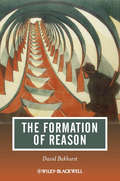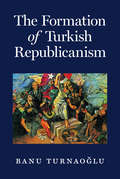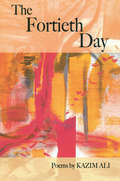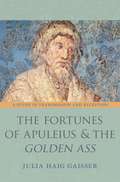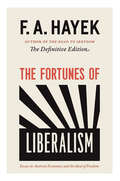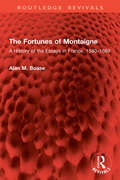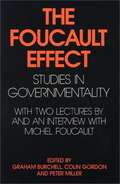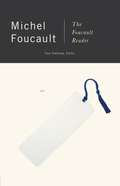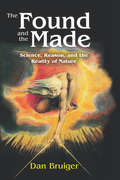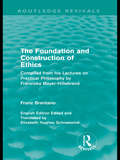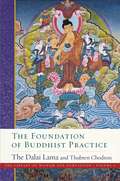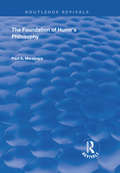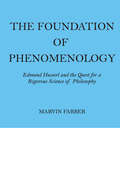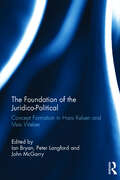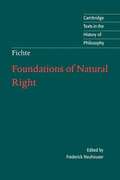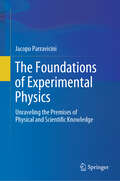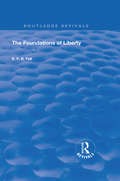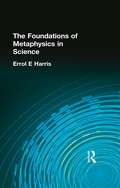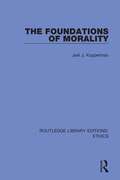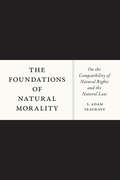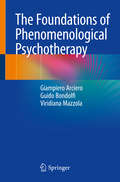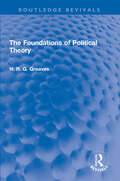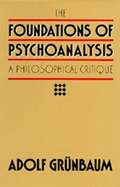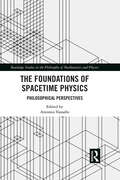- Table View
- List View
The Formation of Reason (Journal Of Philosophy Of Education Ser. #16)
by David BakhurstIn The Formation of Reason, philosophy professor David Bakhurst utilizes ideas from philosopher John McDowell to develop and defend a socio-historical account of the human mind. Provides the first detailed examination of the relevance of John McDowell's work to the Philosophy of Education Draws on a wide-range of philosophical sources, including the work of 'analytic' philosophers Donald Davidson, Ian Hacking, Peter Strawson, David Wiggins, and Ludwig Wittgenstein Considers non-traditional ideas from Russian philosophy and psychology, represented by Ilyenkov and Vygotsky Discusses foundational philosophical ideas in a way that reveals their relevance to educational theory and practice
The Formation of Turkish Republicanism
by Banu TurnaoğluTurkish republicanism is commonly thought to have originated with Mustafa Kemal Atatürk and the founding of modern Turkey in 1923, and understood exclusively in terms of Kemalist ideals, characterized by the principles of secularism, nationalism, statism, and populism. Banu Turnaoğlu challenges this view, showing how Turkish republicanism represents the outcome of centuries of intellectual dispute in Turkey over Islamic and liberal conceptions of republicanism, culminating in the victory of Kemalism in the republic's formative period.Drawing on a wealth of rare archival material, Turnaoğlu presents the first complete history of republican thinking in Turkey from the birth of the Ottoman state to the founding of the modern republic. She shows how the Kemalists wrote Turkish history from their own perspective, presenting their own version of republicanism as inevitable while disregarding the contributions of competing visions. Turnaoğlu demonstrates how republicanism has roots outside the Western political experience, broadening our understanding of intellectual history. She reveals how the current crises in Turkish politics—including the Kurdish Question, democratic instability, the rise of radical Islam, and right-wing Turkish nationalism—arise from intellectual tensions left unresolved by Kemalist ideology.A breathtaking work of scholarship, The Formation of Turkish Republicanism offers a strikingly new narrative of the evolution and shaping of modern Turkey.
The Fortieth Day (American Poets Continuum)
by Kazim AliFrom the Bible to the Quaraan, the fortieth day symbolizes the last moment before deliverance, a moment in time when a supplicant or prophet or stormbeaten passenger knows there is no state &“after,&” but finally accepts the present state as a permanent one.In The Fortieth Day, Kazim Ali follows the fractured narratives and moving lyrics of his debut collection, The Far Mosque, with a deeply spiritual and meditative book exploring the rhetoric of prayer.Kazim Ali was born in the United Kingdom and raised in an Islamic household. He holds degrees from the University at Albany and New York University. He lives in Oberlin, Ohio.
The Fortunes of Apuleius and the Golden Ass: A Study in Transmission and Reception (Martin Classical Lectures #32)
by Julia Haig GaisserThis book traces the transmission and reception of one of the most influential novels in Western literature. The Golden Ass, the only ancient Roman novel to survive in its entirety, tells of a young man changed into an ass by magic and his bawdy adventures and narrow escapes before the goddess Isis changes him back again. Its centerpiece is the famous story of Cupid and Psyche. Julia Gaisser follows Apuleius' racy tale from antiquity through the sixteenth century, tracing its journey from roll to codex in fourth-century Rome, into the medieval library of Monte Cassino, into the hands of Italian humanists, into print, and, finally, over the Alps and into translation in Spanish, French, German, and English. She demonstrates that the novel's reception was linked with Apuleius' reputation as a philosopher and the persona he projected in his works. She relates Apuleius and the Golden Ass to a diverse cast of important literary and historical figures--including Augustine, Fulgentius, Petrarch, Boccaccio, Bessarion, Boiardo, and Beroaldo. Paying equal attention to the novel's transmission (how it survived) and its reception (how it was interpreted), she places the work in its many different historical contexts, examining its representation in art, literary imitation, allegory, scholarly commentary, and translation. The volume contains several appendixes, including an annotated list of the manuscripts of the Golden Ass. This book is based on the author's Martin Classical Lectures at Oberlin College in 2000.
The Fortunes of Liberalism: Essays on Austrian Economics and the Ideal of Freedom (The Collected Works of F. A. Hayek #4)
by F. A. HayekFrom a Nobel Laureate economist, essays on classical liberalism as illustrated by the Austrian school of political economy. The Reagan and Thatcher &“revolutions.&” The collapse of Eastern Europe dramatically captured in the tearing down of the Berlin Wall. F. A. Hayek, &“grand old man of capitalism&” and founder of the classical liberal, free-market revival which ignited and inspired these world events, forcefully predicted their occurrence in writings such as The Road to Serfdom, first published in 1944. Hayek&’s well-known social and political philosophy—in particular his long-held pessimistic view of the prospects of socialism, irrefutably vindicated by the collapse of the Eastern bloc—is fully grounded in the Austrian approach to economics. In this collection, Hayek traces his intellectual roots to the Austrian school, the century-old tradition founded at the University of Vienna by Carl Menger, and links it to the modern rebirth of classical liberal or libertarian thought. As Hayek reminds us, the cornerstone of modern economics—the theory of value and price—&”represents a consistent continuation of the fundamental principles handed down by the Vienna school.&” Here, in this first modern collection of essays on the Austrian school by one of its preeminent figures, is the genesis of this tradition and its place in intellectual history. Two hitherto unavailable memoirs, &“The Economics of the 1920s as Seen from Vienna,&” published here for the first time, and &“The Rediscovery of Freedom: Personal Recollections,&” available for the first time in English, make this collection invaluable for Hayek scholars.
The Fortunes of Montaigne: A History of the Essays in France, 1580–1669 (Routledge Revivals)
by Alan M. BoaseMontaigne’s Essays were republished in France every two or three years from 1580–1669. The Fortunes of Montaigne (originally published in 1935) aims to show what those who bought these Essays during that period sought or found there.The author has attempted to answer three questions in the volume—what are the general ideas of those who are particularly drawn to Montaigne or who write against him?; what did these writers think of the Essays, and what specially interested them in the book?; and what did they borrow from him, or more profitably, what are their less conscious borrowings, their adaptations of his ideas? The book gives an account of the criticism and appreciation of the Essays. Further, it discusses the development of Humanism as opposed to orthodox Christianity, and the part played by the Essays in that development.This book will be of interest to students and researchers of philosophy, history, and literature.
The Foucault Effect
by Colin Gordon Peter Miller Graham BurchellBased on Michel Foucault's 1978 and 1979 lectures at the Collège de France on governmental rationalities and his 1977 interview regarding his work on imprisonment, this volume is the long-awaited sequel to Power/Knowledge. In these lectures, Foucault examines the art or activity of government both in its present form and within a historical perspective as well as the different ways governmentality has been made thinkable and practicable. Foucault's thoughts on political discourse and governmentality are supplemented by the essays of internationally renowned scholars. United by the common influence of Foucault's approach, they explore the many modern manifestations of government: the reason of state, police, liberalism, security, social economy, insurance, solidarity, welfare, risk management, and more. The central theme is that the object and the activity of government are not instinctive and natural things, but things that have been invented and learned. The Foucault Effect analyzes the thought behind practices of government and argues that criticism represents a true force for change in attitudes and actions, and that extending the limits of some practices allows the invention of others. This unique and extraordinarily useful collection of articles and primary materials will open the way for a whole new set of discussions of the work of Michel Foucault as well as the status of liberalism, social policy, and insurance.
The Foucault Reader
by Michel FoucaultMichel Foucault was one of the most influential thinkers in the contemporary world, someone whose work has affected the teaching of half a dozen disciplines ranging from literary criticism to the history of criminology. But of his many books, not one offers a satisfactory introduction to the entire complex body of his work. The Foucault Reader was commissioned precisely to serve that purpose. The Reader contains selections from each area of Foucault's work as well as a wealth of previously unpublished writings, including important material written especially for this volume, the preface to the long-awaited second volume of The History of Sexuality, and interviews with Foucault himself, in the course of which he discussed his philosophy at first hand and with unprecedented candor. This philosophy comprises an astonishing intellectual enterprise: a minute and ongoing investigation of the nature of power in society. Foucault's analyses of this power as it manifests itself in society, schools, hospitals, factories, homes, families, and other forms of organized society are brought together in The Foucault Reader to create an overview of this theme and of the broad social and political vision that underlies it. Edited by Paul Rabinow.
The Found and the Made: Science, Reason, and the Reality of Nature
by Dan BruigerThis book critically examines how mathematical modelling shapes and limits a scientific approach to the natural world and affects how society views nature. It questions concepts such as determinism, reversibility, equilibrium, and the isolated system, and challenges the view of physical reality as passive and inert. Dan Bruiger argues that if nature is real, it must transcend human representations. In particular, it can be expected to self-organize in ways that elude a mechanist treatment.This interdisciplinary study addresses several key areas: the "crisis" in modern physics and cosmology; the limits and historical, psychological, and religious roots of mechanistic thought; and the mutual effects of the scientific worldview upon society's relationship to nature. Bruiger demonstrates that there is still little place outside biology for systems that actively self-organize or self-define. Instead of appealing to "multiverses" to resolve the mysteries of fine-tuning, he suggests that cosmologists look toward self-organizing processes. He also states that physics is hampered by its external focus and should become more self-reflective. If scientific understanding can go beyond a stance of prediction and control, it could lead to a relationship with nature more amenable to survival.The Found and the Made fills a void between popular science writing and philosophy. It will appeal to naturalists, environmentalists, science buffs, professionals, and students of cultural history, evolutionary psychology, gender studies, and philosophy of mind.
The Foundation and Construction of Ethics
by Franz BrentanoChosen and edited by Franziska Mayer-Hillebrand, translated by Elizabeth Hughes Schneewind, this collection of essays reflects Brentano's lectures at the University of Vienna from 1876 to 1894.
The Foundation and Construction of Ethics (Routledge Revivals)
by Franz BrentanoExpanding on the theory of ethics first posited by Brentano in The Origin of our Knowledge of Right and Wrong this re-issued work, first published posthumously in 1952, is based on series of lectures on practical philosophy, given at the university of Vienna from 1876 to 1894. The English-speaking reader will find it interesting to examine the step-by-step development of Brentano’s ethical theory, his extensive critique of British moral philosophers, and his unusually detailed section on casuistry.
The Foundation of Buddhist Practice (The Library of Wisdom and Compassion #1)
by His Holiness the Dalai Lama Venerable Thubten ChodronThe second volume in the Dalai Lama’s definitive and comprehensive series on the stages of the Buddhist path, The Library of Wisdom and Compassion. Volume 1, Approaching the Buddhist Path, contained introductory material that set the context for Buddhist practice. This second volume describes the foundation—the important teachings that will help us establish a flourishing Dharma practice. Traditional presentations of the path in Tibetan Buddhism assume the audience already has faith in the Buddha and believes in rebirth and karma, but the Dalai Lama realized early on that a different approach was needed for his Western students. Starting with the four seals and the two truths, His Holiness illuminates key Buddhist ideas, such as dependent arising and emptiness, to support the reader in engaging with this rich tradition. This second volume in the new Library of Wisdom and Compassion series provides a wealth of reflections on Buddhist history and fundamentals, contemporary issues, and the Dalai Lama’s own personal experiences.
The Foundation of Hume's Philosophy (Routledge Revivals)
by Paul A. MwaipayaFirst published in 1999, this volume endeavours to determine the coherence of David Hume’s philosophical system. That is, to show that Hume’ philosophy is founded upon nothing but his doctrine of belief, from which the entirety of Hume’s philosophy may ultimately be derived. Paul A. Mwaipaya demonstrates the coherence of Hume’s thoughts in order to show where it has been misunderstood and to dissolve confusing interpretations of Hume’s philosophy. This ultimate commonality is derived through examinations of Hume’s general theory of perception, Hume’s theory of knowledge and probability and Hume’s theory of passions and morality.
The Foundation of Phenomenology: Edmund Husserl and the Quest for a Rigorous Science of Philosophy
by Marvin FarberIn this widely hailed and long out of print classic of twentieth century philosophic commentary, Professor Farber explains the origin, development, and function of phenomenology with a view towards its significance for philosophy in general.The book offers a general account of Husserl and the background of his philosophy. The early chapters are devoted to his mathematical-philosophical and psychological studies. The refutation of psychologism is present in detail, together with the critical reaction to it. The development of his logical theories in the light of contemporary literature at the close of the 19th century is next considered. The main content of the six Logical Investigations follows, which contribute to the phenomenological elucidation of experience and knowledge. The phenomenological philosophy of logic as developed in Husserl's later writings is then introduced, followed by a discussion of the phenomenological method and its proper function. Farber makes clear his preference for phenomenology as a purely descriptive method and his opposition to have it serve as a last stronghold of metaphysics.Indispensable as groundwork for descriptive philosophical study, this book will deeply interest not only serious students of philosophy and psychology, but also those who are concerned with the philosophical aspects of mathematics, social and natural sciences, law and psychiatry.
The Foundation of the Juridico-Political: Concept Formation in Hans Kelsen and Max Weber
by Peter Langford Ian Bryan John McGarryHans Kelsen and Max Weber are conventionally understood as initiators not only of two distinct and opposing processes of concept formation, but also of two discrete and contrasting theoretical frameworks for the study of law. The Foundation of the Juridical-Political: Concept Formation in Hans Kelsen and Max Weber places the conventional understanding of the theoretical relationship between the work of Kelsen and Weber into question. Focusing on the theoretical foundations of Kelsen’s legal positivism and Weber’s sociology of law, and guided by the conceptual frame of the juridico-political, the contributors to this interdisciplinary volume explore convergences and divergences in the approach and stance of Kelsen and Weber to law, the State, political science, modernity, legal rationality, legal theory, sociology of law, authority, legitimacy and legality. The chapters comprising The Foundation of the Juridical-Political uncover complexities within as well as between the theoretical and methodological principles of Kelsen and Weber and, thereby, challenge the enduring division between legal positivism and the sociology of law in contemporary discourse.
The Foundations Of Natural Right, according to the Principles of the Wissenschaftslehre
by Michael Baur Frederick Neuhouser J. G. FichteIn the history of philosophy, Fichte's thought marks a crucial transitional stage between Kant and post-Kantian philosophy. Fichte radicalized Kant's thought by arguing that human freedom, not external reality, must be the starting point of all systematic philosophy, and in Foundations of Natural Right, thought by many to be his most important work of political philosophy, he applies his ideas to fundamental issues in political and legal philosophy, covering such topics as civic freedom, rights, private property, contracts, family relations, and the foundations of modern political organization. This volume offers a complete translation of the work into English, by Michael Baur, together with an introduction by Frederick Neuhouser that sets it in its philosophical and historical context.
The Foundations of Experimental Physics: Unraveling the Premises of Physical and Scientific Knowledge
by Jacopo ParraviciniStandard STEM courses, for all of their value, do not tend to include systematic lectures or treatment about the nature of the scientific method. This book aims to provide a wide reflection on the general principles of physics and explore the foundations of scientific knowledge as a whole. The author delves into the study of what lies at the basis of science in general, and physics in particular. Themes such as the relation between natural phenomena and mathematical language are addressed, highlighting the main hubs of conceptual development in science. The volume also examines the conceptual and practical instruments that have been progressively developed to investigate the nature of physics. Furthermore, the author discusses the importance of “scientific practice” within the scientific community, emphasizing its role in advancing knowledge and how it contributes to physics as a whole. Divided into three parts, each covering different aspects of physics and its foundations, the text, while assuming basic knowledge of physics and mathematics taught in university courses, is accessible to all STEM students, and will be useful for anyone looking to gain valuable insights into the nature of physics and the methods used to acquire knowledge in this field.
The Foundations of Liberty (Routledge Revivals)
by E. F. FellOriginally published in 1908, this book aims at setting forth liberty, personal and national - not as a mere utility as is usually the case - but as an a priori moral necessity, the sine qua non of all true civilisation.
The Foundations of Metaphysics in Science (Humanities Paperback Library)
by Harris, Errol EFirst published in 2002. Routledge is an imprint of Taylor & Francis, an informa company.
The Foundations of Morality
by Joel J. KuppermanOriginally published in 1983, this book maintains that the content and character of morality can be understood if it is regarded as a useful societal tool, whose central purposes include the prevention of harm and promotion of security for members of society. At the foundation is the general superiority of policies and attitudes that have good consequences. The book argues that ethics is ‘cognitive’ and explores the kinds of ethical knowledge and the ways in which ethical claims can be challenged and justified.
The Foundations of Natural Morality: On the Compatibility of Natural Rights and the Natural Law
by S. Adam SeagraveRecent years have seen a renaissance of interest in the relationship between natural law and natural rights. During this time, the concept of natural rights has served as a conceptual lightning rod, either strengthening or severing the bond between traditional natural law and contemporary human rights. Does the concept of natural rights have the natural law as its foundation or are the two ideas, as Leo Strauss argued, profoundly incompatible?With "The Foundations of Natural Morality, " S. Adam Seagrave addresses this controversy, offering an entirely new account of natural morality that compellingly unites the concepts of natural law and natural rights. Seagrave agrees with Strauss that the idea of natural rights is distinctly modern and does not derive from traditional natural law. Despite their historical distinctness, however, he argues that the two ideas are profoundly compatible and that the thought of John Locke and Thomas Aquinas provides the key to reconciling the two sides of this long-standing debate. In doing so, he lays out a coherent concept of natural morality that brings together thinkers from Plato and Aristotle to Hobbes and Locke, revealing the insights contained within these disparate accounts as well as their incompleteness when considered in isolation. Finally, he turns to an examination of contemporary issues, including health care, same-sex marriage, and the death penalty, showing how this new account of morality can open up a more fruitful debate.
The Foundations of Phenomenological Psychotherapy
by Giampiero Arciero Guido Bondolfi Viridiana MazzolaThis book addresses selected central questions in phenomenological psychology, a discipline that investigates the experience of self that emerges over the course of an individual’s life, while also outlining a new method, the formal indication, as a means of accessing personal experience while remaining faithful to its uniqueness. In phenomenological psychology, the psyche no longer refers to an isolated self that remains unchanged by life’s changing situations, but is rather a phenomenon (ipseity) which manifests itself and constantly takes form over the course of a person’s unique existence. Thus, the formal indication allows us to study the way in which ipseity relates to the world in different situations, in a way that holds different meanings for different people. Based on this new approach, phenomenological psychotherapy marks a transition from a mode of grasping the truth about oneself through reflection, to a mode of accessing the disclosure of self through a work of self-transformation (the care of self) that requires the person to actually change her position on herself.By putting forward this method, the authors shed new light on the dynamic interplay between a person’s historicity and uniqueness on the one hand, and the related physiopathological mechanisms on the other, providing evidence from the fields of genetics, cardiology, the neurosciences and psychiatry. The book will appeal to a broad readership, from psychiatrists, psychologist and psychotherapists, to researchers in these fields.
The Foundations of Political Theory (Routledge Revivals)
by H.R.G. GreavesFirst published in 1958, The Foundations of Political Theory strives to answer essential questions of politics by studying its foundations. In this book, Mr. Greaves treats the state as only one among several associations whose function is to promote entirely human ends. He tries to reinterpret such ideas as ‘self-realization’ and the ‘good life’ in ways acceptable to students of contemporary philosophy, who reject the theological and metaphysical doctrines these ideas have been tied to in the past. He insists that men get their moral standards and their ideas about what makes life worth living by reflecting on their experience; that there are no ultimate and self-evident moral principles. While admitting that moral standards are subjective in the sense that we cannot explain how men come to have them except by showing how they serve their needs, he refuses to allow that rational argument about them is therefore impossible. Since men are rational, since they have purposes and ideals and not merely desires, and since they know that to realize these purposes they must live with others, there are moral standards acceptable to all men when their function is understood.
The Foundations of Psychoanalysis: A Philosophical Critique
by Adolf GrunbaumThe book, a philosophical critique of the foundations of Sigmund Freud's psychoanalysis, offers a systematic analysis of Freud's theories, examines the effectiveness of the retrospective clinical methods used in psychoanalysis, and discusses free association, dreams, and personality.
The Foundations of Spacetime Physics: Philosophical Perspectives (Routledge Studies in the Philosophy of Mathematics and Physics)
by Antonio VassalloThis book provides an up-to-date overview of the foundations of spacetime physics. It features original essays written by world-class experts in the physics and philosophy of spacetime. The foundational questions regarding the origin and nature of spacetime are branching into new and exciting directions. These questions are not restricted to the quantum gravity program but also arise in the context of a well-established theory like general relativity. Against the background of these quick and diverse developments, this volume features a broad range of perspectives on spacetime. Part I focuses on the nature of spacetime in non-quantum theories, such as Newtonian mechanics and relativity. Part II explores some intriguing conceptual implications of developing a quantum theory of spacetime. The Foundations of Spacetime Physics is an essential resource for scholars and advanced students working in philosophy of physics, philosophy of science, and scientific metaphysics.
